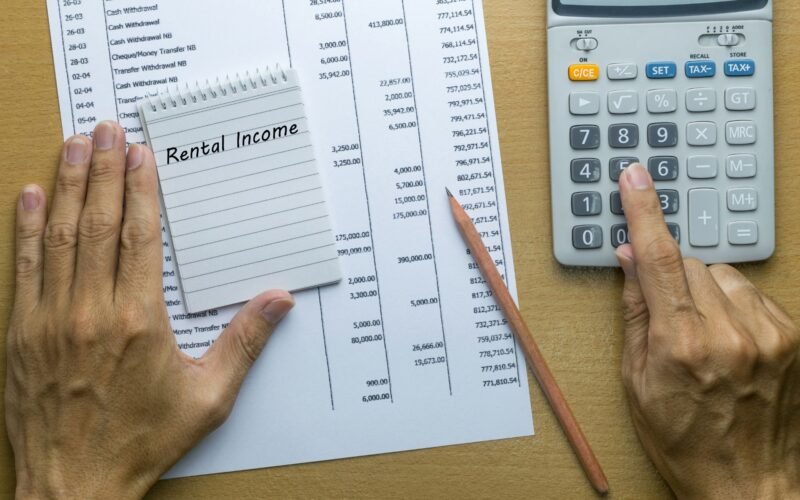|
Getting your Trinity Audio player ready...
|
Being a landlord can be a rewarding venture, but it also comes with important tax obligations. Rental income is considered taxable, and as a landlord, you must understand how to report that income, which deductions are available to you, and how taxes differ based on the type of rental property you own.
In this guide, we’ll explore the key aspects of rental income tax, common deductions for landlords, and tips to ensure compliance with the IRS.
What is Rental Income?
Rental income refers to the money you receive from tenants for the use of your property. It includes regular rent payments as well as any additional payments, such as:
- Advance Rent: Rent received before the period it covers.
- Security Deposits: If you keep a portion of the deposit for damages or unpaid rent, this is taxable.
- Lease Cancellation Fees: Any payment a tenant makes to terminate a lease early is taxable.
- Services Provided by Tenants: If a tenant offers services (like repairs) in exchange for rent, the value of those services is considered rental income.
How to Report Rental Income
Rental income must be reported on Schedule E of IRS Form 1040. Here’s how to correctly report your rental income and any related expenses:
- Determine Your Rental Period: Only report income for periods when the property is available for rent. If you use the property yourself part of the year, calculate the rental-use portion.
- Track All Income: Keep a record of every rent payment and additional income sources, including security deposits retained for damage repairs or unpaid rent.
- Account for Expenses: Expenses related to managing and maintaining the rental property can reduce your taxable income. We’ll dive into these deductions next.
Common Tax Deductions for Landlords
Landlords can reduce their taxable rental income by claiming a range of deductions. Here are the most common ones:
1. Mortgage Interest
If you have a mortgage on the rental property, you can deduct the interest portion of your mortgage payments.
2. Property Taxes
Property taxes paid to your local government are fully deductible.
3. Repairs and Maintenance
Any repairs or routine maintenance that keep the property in good working condition are deductible. Examples include fixing plumbing, patching a roof, or repainting the property.
4. Property Management Fees
If you hire a property management company to oversee your rentals, the management fees are deductible.
5. Depreciation
Rental properties depreciate over time, and the IRS allows landlords to deduct a portion of the property’s cost each year. This is spread over 27.5 years for residential properties.
6. Utilities
If you pay utilities such as water, electricity, or gas for the rental property, these costs are deductible.
7. Insurance Premiums
Landlords can deduct insurance premiums for rental property insurance, including fire, theft, and flood insurance.
8. Travel Expenses
If you need to travel for property management purposes (such as visiting the property or meeting with tenants), your travel costs are deductible, whether it’s for a short distance or out of town.
Special Considerations for Short-Term Rentals
Short-term rentals, such as Airbnb or VRBO, come with their own tax rules. Here’s what landlords of vacation rentals need to keep in mind:
- Reporting All Income: Even short stays generate taxable rental income, which must be reported just like long-term rentals.
- Occupancy Taxes: Some cities or states require landlords to collect occupancy taxes from guests. Be sure to check local regulations and remit these taxes accordingly. For more on the necessary permits and certifications landlords need, check out our detailed guide.
- Mixing Personal and Rental Use: If you use a property for both personal vacations and short-term rentals, you’ll need to carefully track how much time the property is rented versus personal use, as this affects deductions.
Read our guide for more information on short-term rentals via Airbnb.
Tax Implications for LLCs and Corporations Owning Rental Property
If your rental properties are held under an LLC or a corporation, there are specific tax rules to consider. While an LLC generally functions as a “pass-through” entity (meaning the income passes through to your personal tax return), a corporation is taxed separately, which may result in double taxation (corporate and personal taxes). Speak to a tax professional to determine the best structure for your rental business.
Learn more on how to form an LLC for your rental properties.
Tips for Reducing Your Tax Liability as a Landlord
To maximize your tax savings, consider the following strategies:
1. Keep Accurate Records
Maintain detailed records of all rental income and expenses, including receipts, invoices, and bank statements. This will simplify the process when tax season arrives.
2. Take Advantage of Depreciation
Depreciation is one of the most valuable deductions for landlords. Make sure to depreciate the property over its full lifespan, and if you make improvements, these can often be depreciated over a shorter period.
3. Hire a Tax Professional
Rental property taxes can be complex, and a tax professional can help you navigate deductions, depreciation, and tax-saving strategies.
Frequently Asked Questions About Rental Income Tax
Do I need to pay taxes on rental income if the property is only rented part of the year?
Yes, you must report any income earned during the time the property is rented. However, deductions should be proportionate to the rental-use period.
Can I deduct losses if my rental property isn’t profitable?
Yes, if your expenses exceed your rental income, you may be able to deduct the loss on your tax return, subject to certain limitations.
What happens if I sell my rental property?
If you sell your rental property for a profit, you may be subject to capital gains tax. However, you may be able to defer taxes by using a 1031 exchange to purchase a new rental property.
Conclusion
Understanding rental income tax is essential for any landlord. By knowing how to report rental income, taking advantage of deductions, and keeping meticulous records, you can minimize your tax liability and keep your rental business running smoothly.
Make sure to consult with a tax professional if you have any complex tax situations, particularly if you own multiple properties or use your rental for both personal and business purposes. Proper tax management can make a huge difference in your profitability as a landlord.
Read on – Not sure if you need a business license to rent property? Read our specialized guide with all the details.







